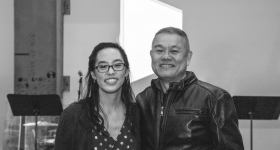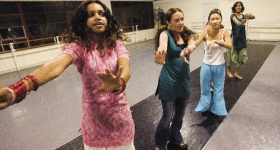Yellowface, David Henry Hwang's new play, is good. And here's why. Without getting into the nitty gritty of a standard performance review, Hwang has a knack for complicating common patterns of speech, images, and actions. He's also funny and a crazy good writer, and this play productively slants familar issues such as love, having an immigrant family, the "American" dream, and the very public intimacy of Asian American identity.
The TheatreWorks' production showcased a really phenomenal set of actors, and I was fortunate enough to interview one of their stars, Francis Jue. Jue plays David Henry Hwang's father, reprising his NYC role. And after graciously fielding my very fan-istic enthusiasm regarding his performance, he openly talked about the importance of this play and its place in Asian American Theater. His insightful voice and perspective cast so much light on what Hwang's play is asking us to do: to really think about the fluidity of our identities as influenced by our work, looks, circumstances, obligations, loved ones, our families, our ties that bind. So below is the interview in its near entirety. Warning: There is a spoiler. And now, forgive me for telling you what to do, but... Go see this play.
There is a lot in this play about "Asian" or "Asian American" being a performance. There is also a lot surrounding the idea of not being Asian enough. Can you talk a little about that?
When I was a young actor, I wanted to play heroes. I wanted to portray Asian Americans in the most positive light at all times. But now I'm not as interested in that as I am in the humanity of any character I play, Asian or not. Playing a recent immigrant in Thoroughly Modern Millie with integrity is just as important to me as playing David's father with integrity. There is just as much humanity to live up to in each of these roles. One may have less dignity; maybe one is more foolish. But aren't we sometimes foolish, and doesn't it make us more human to see that represented?
I used to feel a huge responsibility, almost a burden, representing a billion people every time I performed. Lots of actors of color feel like this. When people like us are onstage, they don't see us as humans. They see us as representations, somehow. When people see Hedda Gabler, they don't think she is every Scandinvavian. They see Hedda Gabler. Romeo and Juliet are not every Italian. They are just Romeo and Juliet. But with people like us, they see all of China, or all yellow people in America. I used to to take that responsibility really seriously. But you know, partly because I've had to play so many kinds of Asians and Asian Americans, I've started to think "What the hell do I know about being Asian American, Chinese American, or Thai American...even though I am Chinese American, because I'm only who I am. Even my siblings have a different experience. And that relieved my burden a little. It also made me think of how natural it is to want to be part of something bigger than ourselves, and to represent. This is a great instinct. But I think not in terms of representation, putting on yellow face, as much as the individuality of that character. Otherwise my portrayal becomes a stereotype and caricature. And how can I do that?
In your opinion, what is the place of a play in Yellowface in the canon of Asian American theater? Where do you think Asian American theater is going these days?
I have no idea! But I think Yellowface is a really important play. It's not just that it's a great story, or entertaining, or moving. I think it's a great American play that will survive the test of time. Because it's not just a particularly Asian American experience, but an American experience in general. The play deals with proclaimed aspirations, ideals, exploration of relationship with government and media, and at the same time, it examines it all through a very personal lens. David is uniquely qualified to talk about these things. He's the eye of the storm in so many different controversies.
I don't know where Asian American theater is going, but I hope Asian American theater stops being considered a niche or an issue, so much as just another American story. It's really rare to see more than one Asian American play in any season of a theater company. Which is great, I admire diversity as a mission statement. But why are we not just considered part of human experience? Why aren't these playwrights being supported more than they are, especially something like Yellowface or After the War at the American Conservatory Theater, or the Long Season? it's really a shame, cheating ourselves out of seeing these plays as human experiences as opposed to an attempt at cultural diversity.
What was the most fun for you?
I think it's the relationship between David and his father; it's the most fully fleshed out relationship in the play. I enjoy that the most. I really love it. When I first read this part of the play, it was just this phone call with his father, which is still at the beginning of the play. I don't think this relationship was originally quite as much of the focus as it turned out to be. I think he showed the play to his father before he passed away, and Henry (David's father) thought he should be a bigger character! And as David continued writing, he realized his father was right. And by the time we were in previews in NYC, it was said to David that more than anything it looked like he had written a tribute to his father. And at the very end, when he got to his last round of rewrites, the script included lines like, "That's what you do after your father dies. You start making his dream your own," even impossible dreams like the ones his father had about being an American, that you can be whatever you want to be, that you can have it if you work at it, that you are not at all limited by the circumstances you were born into.
But his father dies!
But isn't it great that those dreams, even without realization, still exist? It's an irony that we want to be seen as human beings, but we cling to the idea that no one can play an Asian except an Asian! If we go the extreme of that argument, everyone can play everyone We have to believe that others have enough compassion to play us. Otherwise, we deny others the opportunity to understand us. We don't live in a world where things are equal. And we don't have the opportunity to play everyone else. So it's difficult to live up to those ideals, and give it up to other people. But isn't that the goal? That's one of the reasons I feel like I'm always catching up to David. His ideas are so evolved. There are no simple answers. I keep going around and around with these arguments. What I think depends on the time of day!









Comments